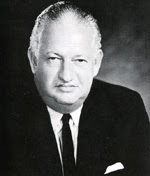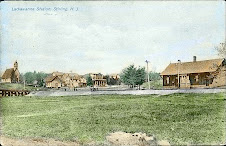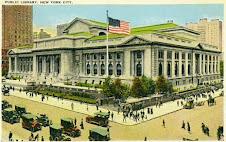 A scene from Ethan Allen's play, Washington; Or, The Revolution. A Drama. The scene takes place in Basking Ridge, New Jersey.
A scene from Ethan Allen's play, Washington; Or, The Revolution. A Drama. The scene takes place in Basking Ridge, New Jersey."SCENE IV. A room in headquarters of GEN. CHARLES LEE, of the Continental Army, at Baskingridge, New Jersey. Time: Forenoon, December 13, 1776.
Enter CAPT. STANDISH and "FARMER GEORGE," now CAPT. GEORGE ALDEN, of the Continental Army. Both in uniform.
CAPT. STANDISH. Dear friend of peaceful days — I rejoice to meet you, though it's a great Surprise.
CAPT. ALDEN. I can almost fancy, Dick, seeing Your honest face, that I am home again.
STANDISH. 1 notice, George, That you have now your straps, as well as I.
ALDEN. Yes. I am a Captain — And Aid to General Charles Lee.
STANDISH. And I am a Captain — and Aid to General Washington.
ALDEN. Dick, I heard you were a prisoner.
STANDISH. Two months ago I was a prisoner. But I have quickly gained my freedom, As you see.
ALDEN. The brutal Cunningham, after all, Must have a streak of kindness to let you Go. How did you escape from him?
STANDISH. I told him of a dream.
ALDEN. And was a soldier managed from a dream?
STANDISH. It was a weird visitor of the night. It surely frightened him. He shunned me as A ghost — And soon got rid of me.
ALDEN. I shall resort to dreams hereafter.
STANDISH. But to business. I am the bearer of orders to General Lee from the Commander-in-Chief, Now encamped upon the Delaware. They Are to be to be delivered immediately.
[Alden receives the papers from Standish.]
ALDEN. I will hand them to the General, Who is in his private chamber. I will return at once to you.
[Alden retires with the papers.]
STANDISH. [musing] My friend George Alden, An aid to this man? I do not rejoice At this; for I could wish him a better Fortune.
[Alden returns.]
ALDEN. The General requests that you await His answer. Dick, what were you saying to Yourself as I came back?
STANDISH. When?
ALDEN. Just now, as I returned.
STANDISH. Nothing worth repeating. I was musing, George.
ALDEN. Yes, Dick. No secrets from me! I heard you Say, "I could wish hiom a better fortune." Tell me-- what meant you by this?
STANDISH. Will you have it, George? Old friend, whose last crust would be half mine, Shall I tel, you?
ALDEN. Dick! Dick Standish-- You have grown false to me unless you tell Me.
STANDISH. Are we quite alone? No danger of other ears?
ALDEN. In this mansion of bygone days, If you should shout, besides myself the walls Alone would be your listener.
STANDISH. Then George-- I could wish you a better fortune than That of Aid to this man Charles Lee. I believe him to be a cused traitor! I echo no man's opinion, but I Have my own. As the confidential Aid To Washington I have learned much, and, As I think, know him well.
ALDEN. Dick! Dick! Ought I to stand here and listen and not resent, This assault upon my superior? Remember, Dick, I wear a sword — And am a soldier,
STANDISH. George — here we meet as friends. Put up the sword and forget that we Are soldiers. This man Lee, is in rank Insubordination at this moment To our great Commander. The orders I Have just brought require him at once to join His strength to Washington's, now across the Delaware. I have carried such before And they were of no avail. They will be So now. O George ! if you knew the heavy Load our Chief daily bears from necessity, You would burst with anger, as I do now To have it needlessly augmented.
ALDEN. By Heavens, Dick ! Make good your words — and though he ranked me as The sun planets, he should know me as Alien to his conduct!
STANDISH. He has friends in Congress, The seat of Civil power; and hence is Sustained as a daily menace to our Cause. How often, in this world, does virtue Unwittingly lay her tribute upon The brow of vice, and after seeks to cleanse The act of wrong by deep repentance. This man Lee was in the South, and there did Little more than cavil at better men. After the disaster on Long Island He was ordered north to assist our General. Would that he had staid where he was harmless, And been food for Southern fevers!
ALDEN. It was not his fault that he came, however.
STANDISH. The fault was afterward. The retreat from New York was done when Harlem and White Plains came tapping upon Its heels. With the certainty of sunshine When the storm abates, so Washington saw Safety in retreat across the Hudson. Early in November a deserter from Fort Washington, gave Howe its plans, and thus The key for capture. Putnam crossed with some Force to Fort Lee, then in command of Greene Which also included Fort Washington, On the Eastern bank.3 General Lee, receiving Orders to follow, refused obedience - And openly criticised his chief. His command was farther up the river.
ALDEN. Then Lee was not responsible For Fort Washington and its loss This was the work of Greene.
STANDISH. Not directly. But it was impropriety to belittle The plans of his superior. Greene — than Whom no truer patriot ever carried sword — Construed his orders to retreat as Optional with him to hold Fort Washington or not, and so decided That Magaw defend it. Congress — the Bungler will ever spoil a master's work — Would have it thus, and Greene was so far excused. On the night before the assault, I was In the boat that carried Washington toward The eastern shore. In midstream Putnam and Greene were met, and counsel had, such as the Stream afforded. It was too late to repair The wrong. Greene contended, even then, that Howe would attack in vain. All returned to Fort Lee, and our General awaited the Coming day with the gravest apprehensions. The end you know.
ALDEN. It was a grievous loss. Twenty-five hundred of our best soldiers, And much needed stores !
STANDISH. It was more grievous To witness the sore distress of our Great-hearted chieftain. Through all, not a word Of censure, though the offense was heavy. He never does complain. If he would, it were Much better. Distress may fly, in words that Blaze and burn, from the overburdened soul, When hot temper holds ajar the door. But so patient and so undismayed ! There is something of mystery about This man that inspires a sense of awe which No other mortal gives. I tell you, George — He is the one hope we have of victory; And upon his single palm he bears up our Falling fortunes, as God bears up the world I
ALDEN. How cruel to add in weight, A needless feather to his burdens !
STANDISH. After the fall of Fort Washington, Cornwallis commanded in New Jersey, With directions to follow Washington And to destroy him. Fort Lee next was Threatened. Greene, now all obedience, Retreated and joined his General at Newark. General Lee, your Commander here, was still At Kings' Bridge with more than seven thousand men. Short enlistments — that military curse Still upon us — and other casualties Had reduced the army now west of the Hudson to ahout three thousand. Lee was Peremptorily ordered to cross. Then, as now, I conveyed the order.
ALDEN. I never knew of such command. I need not ask if Lee refused.
STANDISH. He refused — He still refuses, and will refuse to-day ! Washington, fell back from Newark as Cornwallis came in, and bivouacked at New Brunswick. Lee still disobeyed. Flushed with Victory, the brothers Howe scattered wide Their proclamations of pardon — a tempting Bait to men so sore of heart as ours ! Even delegates in Congress accepted The terms, and lesser men by thousands went Trooping to British power. With his army Dissolving around him, and hope blown upon The freezing breath of winter, it was Washington alone who could say — I will not despair.
ALDEN. Will the world Ever know this mighty man; or knowing, Will it appreciate?
STANDISH. In this extremity, Schuyler sent seven regiments from the North to the aid of our distressed Commander; To the aid of this mighty man, as you Call him — now mighty in his woe ! On December first — this very month I speak of — How dates of trial fasten upon one's Memory as with fangs of steel — Cornwallis Still pushing on, Washington left New Brunswick Then he crossed the Delaware, pleading now With Lee since orders failed. Meantime, and on December third — for I would be accurate When accusation loads my speech — this lazy General, this Charles Lee, crossed the Hudson and Advanced to where we this moment stand — In the center of New Jersey. Does he come to join Washington? God forgive him, for I never will ! He has come to intercept the regiments From Schuyler. By virtue of his rank this Man turns them to his own command. He has Sent an officer to help defend Rhode Island. If sent to the moon he would be as Serviceable; and he intends to follow With his stolen soldiers.George ! Have I made good my words, that this man Is a villain and traitor to the Land we fight for?
ALDEN. So well, Dick, That I shall seek as soon as may be, other Service. With him I cannot remain. The Serpent that strikes and kills were a more honest Friend, since it gives some warning of its Intended battle. Here comes the General.
[Enter GEN. LEE in morning gown and slippers.]
LEE [To STANDISH]. Inclosed Is my answer to General Washington. How is the General? Across New Jersey He seemed light of foot. One might say he were A fugitive from closely pressing powers.
STANDISH. If he were light of foot, It was to hurry to that desired goal Where end our trials. There are some who are Slow of foot on this very mission.
LEE. Give my considerations to the General.
STANDISH. And thanks I give to you in his name. He will doubtless be overjoyed thereat. [STANDISH retires.]
LEE [To ALDEN]. What meant the Captain, That some were slow of foot?
ALDEN. Through these drifting snows, It is nearer truth to say "slow of foot." Thus I took him.
LEE. A shrewd interpretation, And, I guess, a just one. [ALDEN retires.] The alluring promise of my scheme for A separate command overtops my hopes. If the supreme command should quickly Follow, then my end is gained. This revolt Were throttled here, if England held forth the Offer of deserved rank within her armies. At the head of this uprising, I could Compel this offer as the price of peace. What to me is independence — the end And all of these Confederate braggarts — But a means to help my purpose? Charles Lee, Late of European legions, now serves Charles Lee of the Continental Army, And gives to empty air the sham of Deeper feeling. John Adams — whose honesty In this strife gives weight to counsel — favors Me as the military head that should be.u A powerful support ! So do shrewd men Often thrive by aid of dullards, too shallow To comprehend. Greene and Gates are partial. Washington commands me to join him ! Rush — since I have told him this — knows that I Will not do so." Shall I, once of high estate In the army of a king, consent at last To follow the commands of this surveyor Of sheep-browsed hills? His cheap and hungry Followers — the spawn of England's refuse Population driven to these shores — I Despise, as I do him. Yet, it serves me Well still further to dissemble. I have Here cut off and taken to myself three Thousand soldiers, which the gentle-mannered Schuyler sent to him from the North. This further cripples him and strengthens him. So may it be : While Congress, or its leading Spirits, remain my approving friends, Washington may plead and fret and fail. He stands in my way. Then let him fail.
[CAPT. ALDEN rushes in, greatly alarmed.]
ALDEN. The Cavalry ! The British Cavalry are upon us ! Away, General, away, and save yourself !
LEE. [Also in great alarm.] Heaven help us! Where can I go? The house is surrounded ! [Looking from the window.] We are prisoners!
[Thundering noises are heard at the room doors. They are burst open, and British troopers rush in from each side of the room.]
BRITISH CAPTAIN. You are prisoners. [Flourishing his sword. ] Do you surrender?
LEE. Yes — we surrender. I have not my sword. Shall I get my sword? I will secure it For you. [Moves off as if to leave the room.]
BRITISH CAPTAIN. [Stepping in front of LEE.] Never mind the sword ! We want you. General Howe will he glad To see you.
LEE. Shall I dress to go with you? I will prepare myself. [Again moves to leave the room.]
BRITISH CAPTAIN. [Still bars his exit.] We run no risk, General, You will not pass.
LEE. [rubbing his hands in abject submission.] Gentlemen ! Spare my life ! spare my life ! I trust you will Do me no harm. I entreat you, gentlemen, As soldiers of the King — of my King — do You mark me? of my King, whom I have much, Offended — let me live ! I have been drawn Into this — this most foolish revolt. I Will explain to General Howe. I know him well. We have fought as comrades together — a good And valiant man. I will explain to him.
BRITISH CAPTAIN.Then do so when you may. Soldiers, secure your prisoners!
[Soldiers advance and bind both GEN. LEE and ALDEN.]
LEE. Oh! Oh! [Cringing and entreating.] This is so wrong— so wrong to treat a General Thus. But save me, Captain ! Save me from Violence ! I will make amends for what I have done. I will ! I will !
BRITISH CAPTAIN. To horse with both prisoners — And away ! To horse ! to horse !
[All retire.]"
 The scene above is a fictional account of historical events that took place at Widow White's Tavern in Basking Ridge. Although the building is no longer in existence, a marker is at the site of the tavern. It was located at 4 Colonial Drive, near the road's intersection with South Finley Avenue (across the street from St. James R.C. Church).
The scene above is a fictional account of historical events that took place at Widow White's Tavern in Basking Ridge. Although the building is no longer in existence, a marker is at the site of the tavern. It was located at 4 Colonial Drive, near the road's intersection with South Finley Avenue (across the street from St. James R.C. Church).
Source: Allen, Ethan. Washington; Or, The Revolution. A Drama. In Blank verse. Founded upon the Historic Events of the War for American Independence. New York: F. Tennyson Neely, 1899. (Google books edition, http://books.google.com/books?id=2JEzA1KAaXYC, downloaded 2 July 2008).





.gif)








